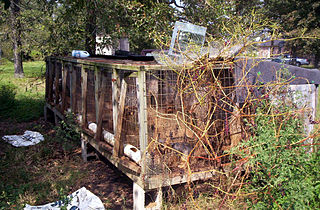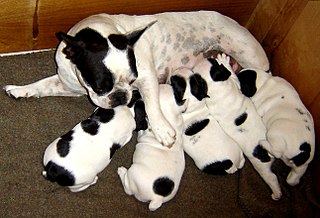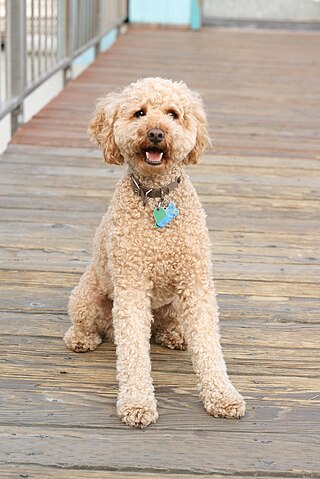Related Research Articles

The American Kennel Club (AKC) is a registry of purebred dog pedigrees in the United States. In addition to maintaining its pedigree registry, this kennel club also promotes and sanctions events for purebred dogs, including the Westminster Kennel Club Dog Show, an annual event which predates the official forming of the AKC, the National Dog Show and the AKC National Championship. The AKC is a non-member partner with the Fédération Cynologique Internationale. The AKC recognizes 200 dog breeds, as of 2022.

In general, an assistance dog, known as a service dog in the United States, is a dog trained to aid or assist an individual with a disability. Many are trained by an assistance dog organization, or by their handler, often with the help of a professional trainer.
The American Society for the Prevention of Cruelty to Animals (ASPCA) is a non-profit organization dedicated to preventing animal cruelty. Based in New York City since its inception in 1866, the organization's mission is "to provide effective means for the prevention of cruelty to animals throughout the United States."

An animal shelter or pound is a place where stray, lost, abandoned or surrendered animals – mostly dogs and cats – are housed. The word "pound" has its origins in the animal pounds of agricultural communities, where stray livestock would be penned or impounded until they were claimed by their owners.

A puppy mill, also known as a puppy farm, is a commercial dog breeding facility characterized by quick breeding and poor conditions. Although no standardized legal definition for "puppy mill" exists, a definition was established in Avenson v. Zegart in 1984 as "a dog breeding operation in which the health of the mill’s dogs is disregarded to maintain a low overhead and maximize profits". They are cited as being a result of increased demand for household pets, especially after WWII. The Veterinary Medical Association of the Humane Society of the United States defines the main characteristics of a puppy mill as "emphasis on quantity over quality, indiscriminate breeding, continuous confinement, lack of human contact and environmental enrichment, poor husbandry, and minimal to no veterinary care."

The Bernese Mountain Dog is a large dog breed, one of the four breeds of Sennenhund-type dogs from Bern, Switzerland and the Swiss Alps. These dogs have roots in the Roman mastiffs. The name Sennenhund is derived from the German Senne and Hund (hound/dog), as they accompanied the alpine herders and dairymen called Senn. Berner refers to the area of the breed's origin, in the canton of Bern. This breed was originally kept as a general farm dog. Large Sennenhunde in the past were also used as draft animals, pulling carts. The breed was officially established in 1912.

Dog breeding is the practice of mating selected dogs with the intention of maintaining or producing specific qualities and characteristics. When dogs reproduce without such human intervention, their offspring's characteristics are determined by natural selection, while "dog breeding" refers specifically to the artificial selection of dogs, in which dogs are intentionally bred by their owners. Breeding relies on the science of genetics, hence a breeder who is knowledgeable on canine genetics, health, and the intended purpose of the dogs attempts to breed suitable dogs.

The Goldendoodle, also known as a Groodle, is a designer dog created by crossbreeding a Golden Retriever and a Poodle. First widely bred in the 1990s, they are bred in three different sizes—each corresponding to the size of Poodle used as a parent.

The St. Bernard or Saint Bernard is a breed of very large working dog from the Western Alps in Italy and Switzerland. They were originally bred for rescue work by the hospice of the Great St Bernard Pass on the Italian-Swiss border. The hospice, built by and named after the Alpine monk Saint Bernard of Menthon, acquired its first dogs between 1660 and 1670. The breed has become famous through tales of Alpine rescues, as well as for its large size, and gentle temperament.

Dog crossbreeds, sometimes called designer dogs, are dogs which have been intentionally bred from two or more recognized dog breeds. They are not dogs with no purebred ancestors, but are not otherwise recognised as breeds in their own right, and do not necessarily breed true.
A backyard breeder is an amateur animal breeder whose breeding is considered substandard, with little or misguided effort towards ethical, selective breeding. Unlike puppy mills and other animal mill operations, backyard breeders breed on a small scale, usually at home with their own pets, and may be motivated by things such as monetary profit, curiosity, to gain new pets and/or working animals, or to show children "the miracle of birth".
In some countries there is an overpopulation of pets such as cats, dogs, and exotic animals. In the United States, six to eight million animals are brought to shelters each year, of which an estimated three to four million are subsequently euthanized, including 2.7 million considered healthy and adoptable. Euthanasia numbers have declined since the 1970s, when U.S. shelters euthanized an estimated 12 to 20 million animals. Most humane societies, animal shelters and rescue groups urge animal caregivers to have their animals spayed or neutered to prevent the births of unwanted and accidental litters that could contribute to this dynamic.

The Leonberger is a giant dog breed, whose name derives from the city of Leonberg in Baden-Württemberg, Germany.
The Humane Society of the United States (HSUS) is an American nonprofit organization that focuses on animal welfare and opposes animal-related cruelties of national scope. It uses strategies that are beyond the abilities of local organizations. It works on issues including pets, wildlife, farm animals, horses and other equines, and animals used in research, testing and education. As of 2001, the group's major campaigns targeted factory farming, animal blood sports, the fur trade, puppy mills, and wildlife abuse.
Animal breeding is a branch of animal science that addresses the evaluation of the genetic value of livestock. Selecting for breeding animals with superior EBV in growth rate, egg, meat, milk, or wool production, or with other desirable traits has revolutionized livestock production throughout the entire world. The scientific theory of animal breeding incorporates population genetics, quantitative genetics, statistics, and recently molecular genetics and is based on the pioneering work of Sewall Wright, Jay Lush, and Charles Henderson.
Animals used by laboratories for testing purposes are largely supplied by dealers who specialize in selling them to universities, medical and veterinary schools, and companies that provide contract animal-testing services. It is comparatively rare that animals are procured from sources other than specialized dealers, as this poses the threat of introducing disease into a colony and confounding any data collected. However, suppliers of laboratory animals may include breeders who supply purpose-bred animals, businesses that trade in wild animals, and dealers who supply animals sourced from pounds, auctions, and newspaper ads. Animal shelters may also supply the laboratories directly. Some animal dealers, termed Class B dealers, have been reported to engage in kidnapping pets from residences or illegally trapping strays, a practice dubbed as bunching.
Lumina Media was an American publisher of magazines, books, and associated websites. Throughout all its incarnations, the business has focused on the pet-keeping and -breeding market, though also with some other topical lifestyle and hobby publications. The original company was founded in 1974 as Fancy Publications by Norman Ridker, absorbing Kennel Club Books in 2004, which made BowTie a main competitor to TFH Publications in the pet-book market. In 2002, Bob Garfield of On the Media called Fancy Publications "the Time Warner of the pet magazine business". After some financial difficulties, BowTie was restructured as I-5 Publishing in 2013 under the new ownership of David Fry and Mark Harris, and took on its present name in 2016.

Petland is a privately owned operator and franchisor of pet stores based in Chillicothe, Ohio. Ed Kunzelman founded the company in 1967. Petland currently operates 131 stores in the United States, and at least 63 in foreign markets including Canada, Japan, China, Mexico, Brazil and El Salvador. The chain is notable for its controversy over documentation from the Humane Society of the United States revealing the purchase of dogs from puppy mills.
Clay Myers is an American photographer, videographer and animal welfare advocate best known for his portraits of rescued companion animals.
Patti Strand is the founder of the National Animal Interest Alliance (NAIA), a broad-based, mainstream, nonprofit animal welfare organization dedicated to encouraging high standards of animal care and treatment, and to preserving the human animal bond. She is an author of books and articles and has served on numerous local, state and federal animal welfare advisory boards, committees and task force bodies.
References
- ↑ Harsha, Keagan (February 22, 2017). "Colorado group on mission to rescue dogs from puppy mills". KDVR . Archived from the original on August 23, 2020. Retrieved August 23, 2020.
- 1 2 "Articles of Incorporation for a Nonprofit Corporation". Secretary of State of Colorado . July 23, 2007. Retrieved August 23, 2020.
- ↑ "About Us". National Mill Dog Rescue. Retrieved August 23, 2020.
- 1 2 Berger, Sydney (November 15, 2012). "Theresa Strader Rescues Thousands of Puppy-Mill Dogs". People . Retrieved August 23, 2020.
- 1 2 Kavin, Kim (July 14, 2019). "When 'Puppy Mill Rescue' Blurs The Line Between Saving And Selling Dogs". Huffington Post . Retrieved August 23, 2020.
- ↑ "Meet Theresa Strader of National Mill Dog Rescue". VoyageDenver. August 11, 2020. Retrieved August 23, 2020.
- ↑ Strader, Theresa. "A Message From Theresa to Lily's Breeder". National Mill Dog Rescue. Retrieved August 23, 2020.
- ↑ Strader, Theresa (March 3, 2019). "How (and why) we do what we do". National Mill Dog Rescue. Retrieved August 23, 2020.
- ↑ Strader, Theresa (September 27, 2019). "Citation Explanation". National Mill Dog Rescue. Retrieved August 23, 2020.
- ↑ Bershadker, Matt (November 27, 2013). "Give Your Pets Your Thanks". Huffington Post . Retrieved August 23, 2020.
- ↑ National Mill Dog Rescue receives prestigious award. KXRM-TV . YouTube. November 27, 2013. Retrieved August 23, 2020.
- 1 2 Miller, Faith (July 24, 2019). "National Mill Dog Rescue faces state investigations, claims of questionable practices". Colorado Springs Independent . Archived from the original on July 25, 2019. Retrieved August 23, 2020.
- ↑ Morfitt, Karen (September 26, 2019). "National Mill Dog Rescue On Probation After State Finds Violations Impacting Animal Safety". KCNC-TV . Retrieved August 23, 2020.
- ↑ Miller, Faith (September 18, 2019). "National Mill Dog Rescue hit with state fine". Colorado Springs Independent . Archived from the original on February 16, 2020. Retrieved August 23, 2020.
- ↑ Kavin, Kim (September 8, 2019). "Regulators Fine High-Profile Dog 'Rescue' Group After HuffPost Investigation". Huffington Post . Retrieved August 23, 2020.